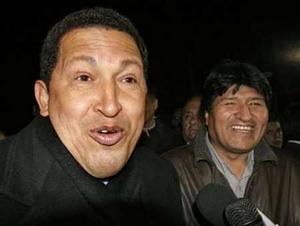 |
 |
 |
 News from Around the Americas | May 2006 News from Around the Americas | May 2006  
Network of 'Hugo's Friends' Links Politics from Mexico to Brazil
 Duncan Campbell - The Guardian Duncan Campbell - The Guardian


| | Venezuela's President Hugo Chavez (L) jokes with journalists, as Bolivian President Evo Morales looks on, upon his arrival to the El Alto Airport, near La Paz May 3, 2006. (Reuters/David Mercado) |
The "Chávez effect", which started when Hugo Chávez was elected as Venezuelan president in 1998, has made waves across the continent, with the "pink tide" now lapping as far as Mexico to the north and Brazil to the south.

The effect is twofold: first, Mr Chávez has been a key player in establishing a network of leftist politicians in the region who can give each other moral and economic support and, second, his use of Venezuela's oil has caused his fellow leaders to examine how they can shift control of their own natural resources from private to public ownership.

The most recent example of the Chávez effect has been Evo Morales' action in Bolivia, but upcoming elections in Mexico and Peru could also lead to a situation in which more countries are involved in a leftwards move which would shift the balance of power away from Washington and challenge foreign ownership.

Currently at the heart of the changes are Mr Chávez, his close ally, Fidel Castro, and Mr Morales, the "three amigos" who espouse the most radical policies in the region. The relationship between presidents Chávez and Castro is strong, and has led to the deployment of 20,000 Cuban doctors in the poorest areas of Venezuela. Cuba has benefited from Venezuelan oil at cheaper prices. Their aims in terms of the economy are considerably to the left of centre-left leaders such as the newly elected Michelle Bachelet in Chile, Néstor Kirchner in Argentina and Luiz Inacio Lula da Silva in Brazil. The next two months will show whether the "pink tide" is washing further inland or receding.

On June 4 in Peru, Ollanta Humala, the former army commander, who is supported by Mr Chávez and who has pledged to redistribute wealth, faces the centre-left former president, Alan García, in the runoff presidential elections. Mr Humala has said he will rewrite contracts with mining companies and "put Peru's natural resources to the service of its people". In April, he took 31% of the vote in the first round to Mr García's 24%, and together they squeezed out the conservative Lourdes Flores. But Mr Humala, whose populist style and background echoes that of Mr Chávez, may not succeed in the runoff, with the latest polls showing him trailing Mr García by 8%.

Mexico will vote on July 2 in what is another key test for the leftist network. A month ago, the leftist former mayor of Mexico City, Andrés Manuel López Obrador, appeared to be headed for victory but his substantial lead has slipped and he is now trailing the conservative, Felipe Calderón. Mr López Obrador, who has made no secret of his plans to shake up and radicalise the Mexican economy with the aim of redistributing wealth, has recaptured some of his lost ground.

The results in Peru and Mexico could determine whether there will really be a major shift in the relationship between the US and its southern neighbours or merely a slight realignment.

Another part of the Chávez effect has been the launch in Caracas of pan-Latin American TV channel Telesur, which aims to challenge CNN as a source of news. It was formed with the backing of Argentina, Brazil, Cuba and Uruguay, but the impetus came from Venezuela. | 
 | |
 |



